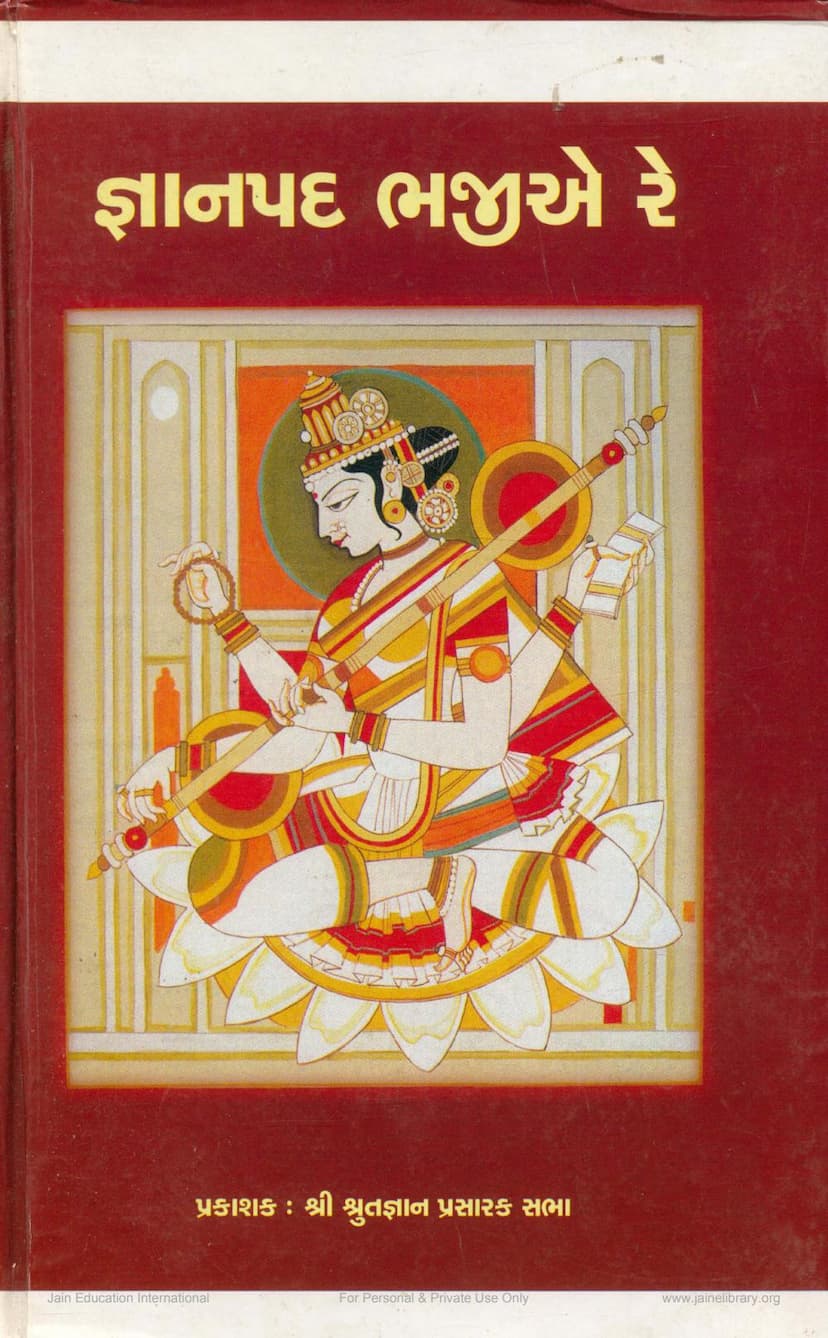Gyanpad Bhaije Re
Added to library: September 1, 2025

Summary
Here's a comprehensive summary of the Jain text "Gyanpad Bhaije Re" based on the provided pages:
Book Title: Gyanpad Bhaije Re (Let Us Worship the Chapter of Knowledge) Publisher: Shrutgyan Prasarak Sabha, Ahmedabad Publication Year: Vikram Samvat 2064 (2008 CE)
Overview:
"Gyanpad Bhaije Re" is a Jain text compiled and published by the Shrutgyan Prasarak Sabha, Ahmedabad. It serves as a guide and collection of scriptures and narratives related to Gyanpanchami, a significant Jain festival dedicated to the worship and reverence of knowledge. The book aims to educate and inspire Jains on the importance of knowledge, its various forms, the correct way to venerate it, and the historical examples of individuals who exemplified devotion to knowledge.
Key Themes and Content:
The book is structured to cover various aspects of Jain knowledge and its practice:
-
Importance of Knowledge: The initial chapters emphasize that knowledge (Gyan) is the fundamental quality of the soul, essential for spiritual progress and liberation. It is described as an "elixir" and "wealth" that is independent and self-sustaining. The text highlights that even the establishment of the Jain community (Sangh) by Tirthankaras is only possible after the attainment of Kevala Gyan (Omniscient Knowledge).
-
Types of Knowledge (Panch Gyan): The book details the five types of Jain knowledge:
- Mati Gyan (Sensory/Mundane Knowledge): Considered the primary tool and foundation for other forms of knowledge.
- Shrut Gyan (Scriptural Knowledge): Derived from scriptures and teachings, it is presented as a goal to be attained.
- Avadhi Gyan (Clairvoyant Knowledge): Knowledge of subtle objects or events beyond sensory perception.
- Manahparyav Gyan (Telepathic Knowledge): Knowledge of the thoughts of others.
- Keval Gyan (Omniscient Knowledge): The highest and most complete form of knowledge.
-
Gyanpanchami Festival and Fast (Tap): A significant portion of the book is dedicated to the ritualistic worship and observance of the Gyanpanchami fast. It outlines the specific rituals, the method of observance, and the underlying philosophy of this devotional practice. The fast is prescribed to be observed for five years and five months, performed with various levels of austerity (ekasana, ayambil, or fasting).
-
Stories and Narratives:
- Varadatta and Gunamanjari: The story of Varadatta and Gunamanjari is highlighted as a key narrative illustrating the negative consequences of disrespecting knowledge (ashatana) and the positive outcomes of its veneration. Gunamanjari's previous life actions and their repercussions are described in detail.
- Vajraswami: The life and teachings of Vajraswami, a great scholar and ascetic, are presented as an exemplary model of devotion to knowledge. His name itself is considered powerful, and the text suggests meditating on his name to improve memory and learning.
- Pundrik and Kandrik: The story of these two brothers illustrates the contrasting paths of spiritual practice and the karmic consequences of respecting or disrespecting the path of renunciation and knowledge.
- Pritthvipaal Raja: This narrative explores the king's quest to understand the interplay of karma and effort (udyam) through various tests, ultimately leading to an understanding of the importance of knowledge and righteous conduct.
- Other Narratives: The book includes numerous other illustrative stories and examples of saints, scholars, and devotees who demonstrated profound reverence for knowledge and its practices.
-
Practices and Rituals:
- Vandana and Chaitya Vandan: Detailed instructions and prayers for paying respects to Moti Gyan (Mati-knowledge) and Shrut Gyan (Scriptural Knowledge) are provided.
- Pooja Vidhi: Various forms of worship, including the Panch Gyan Pooja (worship of the five types of knowledge), are described with specific rituals and offerings.
- Sajjhay and Stavan: Collections of devotional songs (sajjhay) and praises (stavan) dedicated to knowledge and Tirthankaras are included.
- Ritualistic Observances: Emphasis is placed on performing these rituals with sincerity, respect, and without committing ashata (disrespect or harm to knowledge or knowledge-holders).
-
The Role of Teachers and Institutions: The text emphasizes the importance of teachers (Gurus, Pandits, Munis) in imparting knowledge and the need for respect and reverence towards them. It also touches upon historical examples of Jain knowledge centers and the dedication of individuals in preserving and disseminating scriptures.
-
Emphasis on Right Intention and Practice: The book stresses that mere intellectual understanding is insufficient. True reverence for knowledge involves cultivating the right intention (bhava), practicing devotion, and adhering to the prescribed methods (vidhi) to purify the soul and attain spiritual progress.
Key Takeaways:
- Knowledge as Supreme: The text consistently portrays knowledge as the highest pursuit, the key to liberation, and an intrinsic quality of the soul.
- Reverence for Knowledge: It encourages a deep respect for all forms of knowledge, the scriptures, the learned individuals, and the tools of knowledge.
- Gyanpanchami as a Focal Point: The festival of Gyanpanchami is presented as an opportune time for focused spiritual practice and devotion to knowledge.
- The Importance of Intention: The book highlights that the sincerity of intention and the purity of motive are paramount in spiritual practices.
- Ethical Conduct: It links the acquisition and veneration of knowledge with ethical conduct, virtuous living, and the avoidance of disrespect (ashata).
Overall Purpose:
"Gyanpad Bhaije Re" is a valuable resource for Jains seeking to understand and deepen their appreciation for knowledge within the Jain tradition. It provides practical guidance for observing Gyanpanchami, offers inspiring narratives, and reinforces the profound philosophical significance of knowledge in achieving spiritual goals.